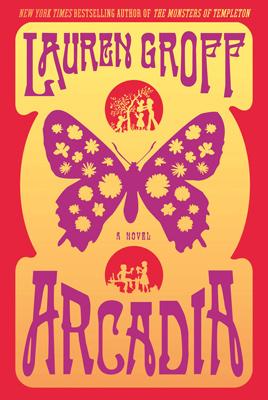Arcadia, by Lauren Groff ’01 (Voice Hyperion)
Reviewed by William H. Pritchard ’53
 |
[Fiction] Three years ago Lauren Groff brought out The Monsters of Templeton, a first novel whose originality received justified acclaim. After a collection of short stories, she has followed up with an ambitious historical novel about the fortunes of a commune and its members.
Located in the woods of upstate New York (with Syracuse and Rochester in the distance), Arcadia House is dedicated to establishing an unhierarchical society in which pure and truthful lives may be led. We observe this experiment through the eyes of Ridley Stone, a boy whose small stature earns him the nickname of “Bit.” Groff stays within Bit’s consciousness, from his very early memories and sensations to age 14, when he, his parents and the communal remnant of members are forced out of their paradise as state and local police move in. In the words of Handy, their leader, it was a matter of “Old bastard Reagan and his war on drugs.” Nine hundred members are reduced eventually to 60, who subsist on canned beans and boiled cabbage until they must move to “the gritty Outside.” For Bit, it is “a puncture in the world” in which “everything [he] knew about himself is spilling out” into a new world of “ugly urban trees, pigeons, piss caked on walls.”
The novel’s four parts move from the times of Nixon and Reagan up through the 9/11 attacks and eventually—in 2018—to a pandemic of severe acute respiratory infection. After leaving Arcadia, Bit goes to college and becomes a painter. Then his wife, Helle, whom he loved back in Arcadia days, leaves him.
He takes up the teaching of photography by coaxing his students into the analog mode, attempting to revive the “lost art of the darkroom” by having them do without the electronic animation that unrelentingly prevails. In an especially poignant moment, Sylvie, one of his students deprived for a week of her “digital things,” finds the world changed:
In the thrilling cold darkness without even a phone for protection, she understood how alive people must have felt before you could reach anyone at any time. How it must have taken so much effort to connect with people.
Sylvie finds the past more “subjective” without the online news for everyone to see and the future more “distant because it had to be scrupulously planned.” So Bit, as a teacher, has carried some of the Arcadian rhythms with him.
Much of the life in Arcadia before its dissolution—it becomes a computer business called Erewhon (after Samuel Butler) Illuminations—is suggested by the lively names Groff gives her communards: Sweetie Fox, Peanut, Wonder Bill, Captain Amerika, Saucy Sally, all of whom move about the layout in Arcadia in places like the Soy Dairy, the Octagonal Barn, the Pink Piper, the Motor Pool, the Bread Truck. The writer seems genuinely fond of her characters; there’s scarcely a trace of satire in her treatment, as if, having created fictional persons, she feels protective toward them.
In fact, Groff’s treatment pretty much lacks anything savoring of the comic and the humorous, and this absence is felt more strongly because of the book’s narrative mode: third-person present tense, no quotation marks to signal speech, and a relatively toneless voice of presentation, as if the authorial hand were everywhere and nowhere, operating in a panoramic and mainly unvoiced way.
But near the end of the novel a new voice is heard. Paradise having been lost, a more recognizably human world emerges, which this reader felt to be, all things considered, a fortunate and welcome event.
Pritchard, an author and literary critic whose work appears frequently in The Hudson Review and other publications, is Amherst’s Henry Clay Folger Professor of English.